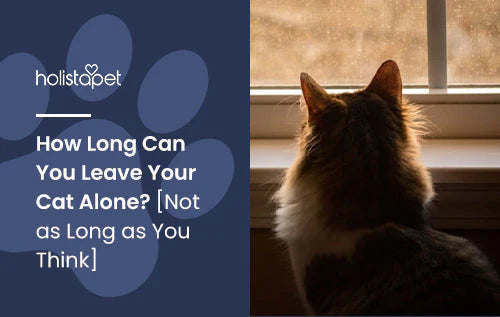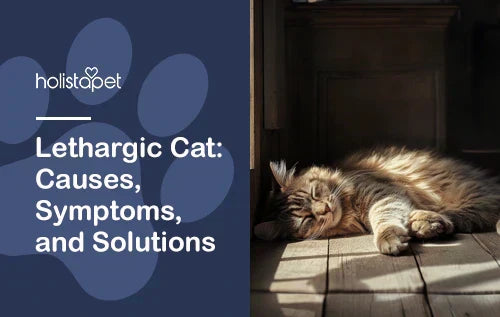Long business trip coming up? Need to visit your in-laws across the country? If you know you'll be out of the house for an extended period, you may be wondering how long you can leave your cat alone. The answer? Not as long as you think, and this article will explain why! Here is what you can do to keep your cat safe and happy while you're away.
Is It Okay to Leave My Cat Alone?
Pet owners often pick cats over dogs because they are generally low-maintenance. You don't have to take a cat out for a walk twice a day or train them, and they are typically self-sufficient for most things. Unlike dogs, cats enjoy solitude so long as they have a clean litterbox, access to fresh water, and an automatic feeder that will properly dispense their meal.
While cats are independent, they are still social pets that shouldn't be left alone for extended amounts of time. If you have a job that has you out of the house for eight hours every single day or you have a long trip ahead, your cat may become lonely while you're away. Loneliness can lead to some unwanted behaviors.

Do Cats Get Lonely?
While every cat is different, studies have proven that cats can get lonely when you're gone. Cats are creatures of habit and often create a routine that revolves around their family. You might notice that your cat likes being involved in your daily activities. Cats left alone for long periods can become lonely, bored, and anxious. You might even notice signs of separation anxiety. Symptoms of separation anxiety include clawing at doors, scratching furniture, vomiting, and refusing to use the litterbox. Your cat might also start overgrooming.
How Long Can Cats Be Left Alone?
Unless they experience a health emergency, most cats can manage if you're gone for 8-12 hours each day. Just make sure they have a clean litterbox, water, and food. If you are planning a trip, keep in mind that veterinarians recommend you don't leave a cat alone for more than 24 hours. If your trip is longer than that, like leaving cats alone for 4 days, you should consider having a friend or pet sitter check on your cat twice a day to make sure they have food, a clean litterbox, and company.
Kittens are a different story. Since three to six-month-old cats need to be fed three times per day (about every four to six hours), kittens cannot be left alone. Kittens are also curious and mischievous and might get injured while you're away. If you plan to leave a young cat alone for more than eight hours, put them in a kitten-proof room and have someone check on them twice a day.
Older cats can be tougher to leave alone. Seniors are even more sensitive to changes in routine. The stress caused by you being gone can be harmful to a cat's physical and mental well-being. Some older cats also have particular feeding requirements and medication. Try not to leave an older cat alone overnight. Consider having a friend or sitter stay at your home.
How Long Can Cats Live Alone?
Healthy adult cats can be left alone overnight if necessary, although 24 hours is the maximum amount of time vets recommend. If you plan to be gone overnight, make sure to clean the litterbox before you go. Give them fresh water, and consider an automatic feeder to ensure that they are fed at night and in the morning.
Can I Leave My Cat Alone for More Than One Day?
After 24 hours, it is highly recommended that you have someone check on your cat each day — twice a day if possible. A friend or professional cat-sitter can make sure your feline has enough water and that their automatic feeder is working correctly. They can also play with your pet and scoop litter to ensure it doesn't start peeing elsewhere.

Tips For Leaving Your Cat Alone
Cats are intelligent, clever, and independent. Though, your cat still needs some help to make sure it is comfortable while you're away. Here are some things to keep in mind before you kiss your kitty goodbye.
Consider an Additional Litter Box
If you plan to be gone for more than a day, you might want to set up a second litterbox for your cat to use. This is especially important if you have more than one cat. Cats can be particular about where they use the bathroom. If they feel their litterbox is too dirty, they might start peeing and defecating in unwanted places.
Set Up an Automated Pet Feeder
Automatic feeders are essential if you are planning to be gone for more than eight hours. These feeders allow your cat to stick to the same eating routine, even in your absence. Ensure the automatic feeder is filled before you leave, and always have your sitter check that it's running properly before they leave.
Make Sure Water is Clean
Cats like clear water without the slightest trace of contaminants. They often turn their noses up at water that doesn't exactly fit their standards. That's why so many cats are dehydrated. When you're gone, fur and other debris can build up in water bowls. This can lead to your cat getting sick or not drinking enough fluids each day.
If you plan to be gone for more than a day, have your cat sitter clean your cat's water bowl and fill it with fresh water each time they visit. Cleaning the bowl twice a day is ideal. You can also try a water fountain since the moving water will entice your cat to drink more.
Provide Them with CBD Cat Treats
Many cats experience anxiety when their owners leave. Anxiety can lead to destructive behaviors, including scratching furniture and doors or urinating around the house. To help your pet feel less anxious, have your friend or sitter give the feline CBD cat treats every morning that they visit and again at night. They are not only tasty and fun for your cat but very beneficial to their health.
CBD is a non-psychoactive cannabinoid, meaning it won't get your cat high. It interacts with receptors in your cat's body, boosting its endocannabinoid system (ECS). This system inspires overall well-being by improving your cat's homeostasis. These receptors are in all major systems, including the nervous, immune, and digestive systems. That's why CBD can assist so many functions, both mental and physical.
Provide Them With Comfy Spaces
Without your cuddles, your cat will need a few spots around the house where they can feel relaxed and comfy. This can be a cat bed with one of your shirts inside, a cat tree with an added blanket for comfort, or a pillow inside their favorite cardboard box. You may also consider a local pet boarding facility if you're comfortable with professional help.
Make Sure They Have Toys
Even though cats sleep a lot, they still need exercise and stimulation to be healthy and happy. Provide your cat with various toys for them to choose from, including feathery toys, jingle bells, and ribbons hanging on the wall. Consider interactive toys and puzzles that will give your cat a challenge. Think motion-detecting critters or gadgets that have the cat solve a puzzle to access the treat inside. You can have a pet sitter reset these toys or replace them with new ones when they stop by.
Block Off Rooms
Loneliness and anxiety can result in destructive feline behavior, but they can also get rowdy due to sheer boredom. Close off rooms you don't want your cat in without supervision, such as an office with expensive equipment. In rooms your cat is allowed, make sure to cover up couches so that they aren't scratched in your absence. Remove any collectibles, valuables, and breakable items from counters and shelves. Remove toxic plants and other things you don't want your cat investigating.
Spray Scratching Posts with CBD Catnip Spray
You can encourage your cat to keep their claws off the sofa by providing them with scratching posts. Some cats also like to scratch hanging pieces of fabric or cardboard lounges. Encourage your cat even further by spraying the scratchers with CBD catnip spray. Most cats can't resist catnip, and the addition of CBD will soothe and relax them.
Install Cat Cams
There are plenty of pet cams you can find online that will allow you to supervise from an app on your phone. This way, you will be able to keep an eye on your cat if you're out of the house for a few days. You'll be able to notice if something seems off and call up your pet sitter if needed.
Put Your TV on a Timer
If you have the technology, it might be a nice touch to put your television on a timer. The background noise of music or human voices may comfort your cat. It is an easy way to replicate a sense of normalcy for your pet.
Get a Second Cat
If you often have to take business trips, it might be a good idea to get a second cat. Another feline will not replace your presence, but it is a companion to cuddle and play with when you're away. If you get a second cat, you will still need a pet sitter to come each day to check on your cats. You still shouldn't leave cats alone for more than eight hours every day, even if you have more than one.

Is It Cruel to Leave Your Cat Alone?
Leaving a cat alone every once in a while isn't cruel. Cats are independent creatures that can fend for themselves. All you have to supply is food, water, and a place to go to the bathroom. If you plan to leave the house for long hours every day, a cat may not be the right pet for you. Since most cats don't enjoy the same amount of physical interaction that dogs do, people often assume that cats would love as much alone time as possible. However, they still require supervision and mental stimulation.
Final Thoughts
Cats are independent, but they don't like being alone for hours every single day. Try to avoid leaving your cat alone for more than 24 hours without a pet sitter checking in. We never want to leave our pets alone, but with these tips, you can walk out the door knowing your cat will be safe and stress-free! And if you want to know more about taking care of your cats, visit here.







![Probiotics For Dogs [Soft Chews] - HolistaPet](http://www.holistapet.com/cdn/shop/files/Probiotic-Infographic-1_472d7a29-e30c-435a-9638-1365d8c3a9f9.jpg?v=1725384841&width=104)



























Leave a comment
All comments are moderated before being published.
This site is protected by hCaptcha and the hCaptcha Privacy Policy and Terms of Service apply.